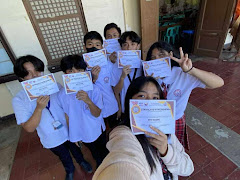"People are subject to change." The first time I encountered this statement was when I had all the time in the world—tucked under my blanket, the AC on full blast, watching Classroom of the Elite. Ever since that moment, those words have been stuck in my mind. Change is inevitable, shaping who we are and who we will become. Like the shifting seasons or the tide meeting the shore, we are constantly evolving, whether we realize it or not. At times, change can be daunting, a force that pulls us away from the comfort of the present. But looking at both sides of the story, I’ve come to realize that change can also be beautiful—a gateway to growth, new experiences, and a future filled with endless possibilities.
But have you ever wondered what your life would look like 15 years from now you ask?
Whenever the thought in my mind drifts to my future, I envision myself as a successful nurse, dedicating my life to caring for others and making a difference in the medical field. With years of hard work and perseverance, I will have built a stable career, one that not only fulfills my passion but also provides financial security. I imagine myself coming home to my own safe space, a cozy place that reflects my personality, where I can truly relax and unwind. A time will come when I will no longer feel guilty about doing the things I love, whether it’s indulging in my favorite books, watching movies, or simply enjoying the quiet moments of life, because I know I have worked hard for them. Money will no longer be a source of worry; instead, I will have the freedom to pursue my passions without hesitation.
More than personal success, I envision a future where my family remains as close as we are now. As we grow older and build our own lives, I see us still finding time to meet, sharing stories and laughter like we always have. No matter how far life takes us, I imagine our bond remaining strong, unshaken by distance or time. I see us fulfilling the dreams we once talked about, standing side by side, celebrating not just our individual achievements but the unbreakable connection that has carried us through the years.

I picture a day when I can finally give my parents everything they have ever wished for. I see myself walking them through a home filled with comfort, one they no longer have to worry about. I imagine them waking up without the weight of responsibilities pressing down on them, finally able to enjoy the life they have worked so hard to build for me and my siblings, because after all, its their first time living life too. I hope to see their smiles out of true happiness, knowing that all the years of effort and love they poured into me and my siblings have come full circle.
.jpg)
As for my brothers, I hope that no matter how much time passes, we will still be there for each other. I imagine us reminiscing about childhood, laughing at the moments that once felt so small but now mean everything. And when life gets tough, I hope they will still be there to lend me their torches, just like when I was in Grade 1, borrowing their medals to feel like a winner. I envision us achieving the dreams we once spoke about as kids, still cheering each other on, still standing together, no matter how much the world changes around us.

The same goes for my friends. Even if life takes us in different directions after school, I hope that we will still be there for one another, maintaining the connection we built through the years. They have always been a part of my journey, from the days I worried about not having friends in junior high to now, where I am surrounded by people who truly made me joyful. They have made my school life bearable, filling my days with laughter, support, and memories I will cherish forever. No matter how much time passes, I hope that we can always find our way back to each other, continuing to share moments of joy and companionship as we grow.
As I look toward the future, I envision my self as someone who has learned how to become truly independent, not relying on someone else for every small inconvenience. I want to be brave, to face life with the understanding that mistakes are a natural part of growth rather than something to fear. Most importantly, I hope that I have learned to take better care of myself so that I can continue moving forward with strength, resilience, and self-love.
Now, all of those are what I hope happens in this lifetime. If God permits, I hope to fulfill them soon.
"I don't know what the future may hold, but I know who holds the future"-Ralph Abernathy
References:
Blogger. (https://www.blogger.com)






.jpg)












.jpg)

